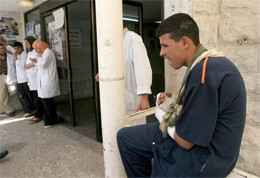The Electronic Intifada 29 September 2008

A young man with broken arms sits near nurses on strike in Nablus. (Naela Khalil/IRIN)
According to the World Health Organization (WHO), about 28 percent of doctors, nurses and administrators of hospitals were on strike, affecting some services in the various medical centers in the enclave, especially psychiatric care.
Medical non-governmental organizations reported treating more patients, saying it was straining their resources.
However, the true impact will be felt at the beginning of October, medical officials said, as many Muslim patients avoid elective procedures during Ramadan.
The number of strike participants appears to be gradually decreasing. In the initial days of the strike, it was estimated that more than half the relevant labor forces abstained from work.
At first, there had been concerns that strikers would not be paid by the Palestinian Authority in Ramallah. On 25 September, however, when salaries were delivered, there were no reports of the strikers losing out.
Even payday was fraught as there was a growing shortage of Israeli shekels, the main currency in the Occupied Palestinian Territories, due to the Israeli blockade. The recurring problem would become severe within days, economists said.
Meanwhile, some top health administrative officials who joined the strike have been replaced, with some observers saying this was another step towards Hamas’ consolidation of power.
UN officials had been trying to mediate between Hamas and Fatah to end the strikes.
“Because of the humanitarian impact and our responsibility to the population of Gaza, where education and health are at risk, the UN will do what it can to make sure people do not suffer,” a senior official, who did not want to be identified, told IRIN.
The strikes, led by Fatah-allied unions protesting Hamas appointments to the services, are seen to be of a political nature.
However, with the strikes’ influence fading, observers in Gaza said these were also signs of Fatah’s ebbing power in the Strip and disenfranchisement of its activists, many of whom opposed the strikes due to their partisan nature.
Gaza has been under a tight blockade since the Hamas takeover last year, crippling the economy, halting development work and affecting public services, such as water and sanitation.
At a round table on 22 September held by the Palestinian Centre for Human Rights in Gaza with members of various parties and organizations to find solutions to stave off the new governmental crisis, many participants said the problem was political, rather than legal, and not simple to solve.
Without a correction of the relations between the factions, there were more chances for violence, observers said, and little hope of things getting better in the enclave.
PCHR’s director, Raji Sourani, said that without a political solution, Palestinians faced a “new dark tunnel.”
This item comes to you via IRIN, a UN humanitarian news and information service, but may not necessarily reflect the views of the United Nations or its agencies. All IRIN material may be reposted or reprinted free-of-charge; refer to the copyright page for conditions of use. IRIN is a project of the UN Office for the Coordination of Humanitarian Affairs.
Related Links


